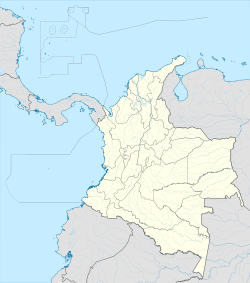Funza
| |
|---|---|
Municipality and town | |
 Wetland in Funza | |
 Location of the municipality and town of Funza in the Cundinamarca Department of Colombia | |
| Coordinates: 4°43′3″N 74°12′34″W / 4.71750°N 74.20944°W | |
| Country | |
| Department | |
| Province | Western Savanna |
| Founded | 20 April 1537 |
| Founded by | Gonzalo Jiménez de Quesada |
| Government | |
| • Mayor | Manuel Antonio Montagu Briceño (2016-2019) |
| Area | |
| • Municipality and town | 67.75 km2 (26.16 sq mi) |
| • Urban | 7.78 km2 (3.00 sq mi) |
| Elevation | 2,548 m (8,360 ft) |
| Population (2018 census)[1] | |
| • Municipality and town | 93,154 |
| • Density | 1,400/km2 (3,600/sq mi) |
| • Urban | 90,671 |
| • Urban density | 12,000/km2 (30,000/sq mi) |
| Demonym | Funzano |
| Time zone | UTC-5 (Colombia Standard Time) |
| Area code | +1 |
| Website | Official website |
Funza (Spanish pronunciation: [ˈfunsa]) is a municipality and town of Colombia in the Western Savanna Province, of the department of Cundinamarca. Funza is situated on the Bogotá savanna, the southwestern part of the Altiplano Cundiboyacense with the urban centre at an altitude of 2,548 metres (8,360 ft). In Funza the La Florida wetland, part of the wetlands of Bogotá, a remnant of the Pleistocene Lake Humboldt, still exists. The town is part of the Metropolitan Area of Bogotá and borders Madrid and Tenjo in the north, Mosquera in the south, Madrid in the west and Cota and the locality Engativá of the capital Bogotá in the east. The eastern boundary is formed by the Bogotá River. Funza is the site of the former main settlement Bacatá of the Muisca Confederation. Modern Funza was founded by Gonzalo Jiménez de Quesada during the Spanish conquest of the Muisca on April 20, 1537.[2]
- ^ Citypopulation.de Population of Funza municipality with localities
- ^ (in Spanish) Official website Funza Archived 2015-12-21 at the Wayback Machine


